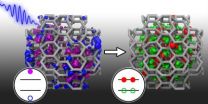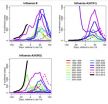(Press-News.org) Alexandria, VA – Would you drink water from a toilet? What if that water, once treated, was cleaner than what comes out of the faucet? Although the imagery isn't appealing, as climate change and population growth strain freshwater resources, such strategies are becoming more common around the world — and in the United States.
Over the last several decades, local and regional water shortages have become increasingly common. These shortages have led to increased friction over water resources. Technologies are currently being developed to help make wastewater recycling more efficient and less expensive, but talking people into drinking "flush to faucet" water is the bigger challenge, experts say. Will recycled wastewater become the norm where you live? And will enough wastewater be available to offset expected freshwater shortages? Read the story and find out at http://bit.ly/V508eW.
Read this story and more in the February issue of EARTH Magazine. Learn how the sun provides water to the moon; spy on Indonesian volcanoes with satellites; and discover Israel's undersea gas reservoirs all in this month's issue of EARTH.
###
Keep up to date with the latest happenings in Earth, energy and environment news with EARTH magazine online at http://www.earthmagazine.org/. Published by the American Geosciences Institute, EARTH is your source for the science behind the headlines.
The American Geosciences Institute is a nonprofit federation of geoscientific and professional associations that represents more than 250,000 geologists, geophysicists and other earth scientists. Founded in 1948, AGI provides information services to geoscientists, serves as a voice of shared interests in the profession, plays a major role in strengthening geoscience education, and strives to increase public awareness of the vital role the geosciences play in society's use of resources, resiliency to natural hazards, and interaction with the environment.
EARTH: Drinking toilet water
The science (and psychology) of wastewater recycling
2013-01-29
ELSE PRESS RELEASES FROM THIS DATE:
1 in, 2 out: Simulating more efficient solar cells
2013-01-29
Using an exotic form of silicon could substantially improve the efficiency of solar cells, according to computer simulations by researchers at the University of California, Davis, and in Hungary. The work was published Jan. 25 in the journal Physical Review Letters.
Solar cells are based on the photoelectric effect: a photon, or particle of light, hits a silicon crystal and generates a negatively charged electron and a positively charged hole. Collecting those electron-hole pairs generates electric current.
Conventional solar cells generate one electron-hole pair ...
Study finds eating deep-fried food is associated with an increased risk of prostate cancer
2013-01-29
SEATTLE – Regular consumption of deep-fried foods such as French fries, fried chicken and doughnuts is associated with an increased risk of prostate cancer, and the effect appears to be slightly stronger with regard to more aggressive forms of the disease, according to a study by investigators at Fred Hutchinson Cancer Research Center.
Corresponding author Janet L. Stanford, Ph.D., and colleagues Marni Stott-Miller, Ph.D., a postdoctoral research fellow and Marian Neuhouser, Ph.D., all of the Hutchinson Center's Public Health Sciences Division, have published their findings ...
Study shows climate change could affect onset and severity of flu seasons
2013-01-29
The American public can expect to add earlier and more severe flu seasons to the fallout from climate change, according to a research study published online Jan. 28 in PLOS Currents: Influenza.
A team of scientists led by Sherry Towers, research professor in the Mathematical, Computational and Modeling Sciences Center at Arizona State University, studied waves of influenza and climate patterns in the U.S. from the 1997-1998 season to the present.
The team's analysis, which used Centers for Disease Control data, indicates a pattern for both A and B strains: warm winters ...
Research: Military women may have higher risk for STIs
2013-01-29
As the number of women in the military increases, so does the need for improved gynecologic care. Military women may be more likely to engage in high-risk sexual practices, be less likely to consistently use barrier contraception, and, therefore, more likely to contract sexually transmitted infections (STIs), according to research recently released by a physician at Women & Infants Hospital of Rhode Island.
Vinita Goyal, MD, MPH, followed up earlier research into the rates of contraception use and unintended pregnancy by today's military women and veterans with her latest ...
USGS-NOAA: Climate change impacts to US coasts threaten public health, safety and economy
2013-01-29
According to a new technical report, the effects of climate change will continue to threaten the health and vitality of U.S. coastal communities' social, economic and natural systems.
The report, Coastal Impacts, Adaptation, and Vulnerabilities: a technical input to the 2013 National Climate Assessment, authored by leading scientists and experts, emphasizes the need for increased coordination and planning to ensure U.S. coastal communities are resilient against the effects of climate change.
The recently released report examines and describes climate change impacts ...
When food porn holds no allure: The science behind satiety
2013-01-29
New research from the University of British Columbia is shedding light on why enticing pictures of food affect us less when we're full.
"We've known that insulin plays a role in telling us we're satiated after eating, but the mechanism by which this happens is unclear," says Stephanie Borgland, an assistant professor in UBC's Dept. of Anesthesiology, Pharmacology and Therapeutics and the study's senior author.
In the new study published online this week in Nature Neuroscience, Borgland and colleagues found that insulin – prompted by a sweetened, high-fat meal – affects ...
Power helps you live the good life by bringing you closer to your true self
2013-01-29
How does being in a position of power at work, with friends, or in a romantic relationship influence well-being? While we might like to believe the stereotype that power leads to unhappiness or loneliness, new research indicates that this stereotype is largely untrue: Being in a position of power may actually make people happier.
Drawing on personality and power research, Yona Kifer of Tel Aviv University in Israel and colleagues hypothesized that holding a position of authority might enhance subjective well-being through an increased feeling of authenticity. The researchers ...
Artificial pancreas: The way of the future for treating type 1 diabetes
2013-01-29
Montréal, January 28, 2013 – IRCM researchers, led by endocrinologist Dr. Rémi Rabasa-Lhoret, were the first to conduct a trial comparing a dual-hormone artificial pancreas with conventional diabetes treatment using an insulin pump and showed improved glucose levels and lower risks of hypoglycemia. Their results, published today in the Canadian Medical Association Journal (CMAJ), can have a great impact on the treatment of type 1 diabetes by accelerating the development of the external artificial pancreas.
The artificial pancreas is an automated system that simulates ...
Why are there redheads? Birds might hold the clues
2013-01-29
Red coloration—historically seen as costly in vertebrates—might represent some physiological benefit after all, according to research published in the journal Physiological and Biochemical Zoology.
Pheomelanin, which is responsible for red hair and freckles in humans and orange and chestnut coloration in other animals, is known to increase the damage to skin cells and melanoma risk when present in large amounts. Furthermore, its creation involves the consumption of glutathione, a beneficial antioxidant.
In an attempt to unearth the factors favoring the evolution of ...
AGU Journal Highlights -- Jan. 28, 2013
2013-01-29
The following highlights summarize research papers that have been recently published in Geophysical Research Letters (GRL), Water Resources Research, Journal of Geophysical Research – Planets (JGR-E), Journal of Geophysical Research – Oceans (JGR-C), and Journal of Geophysical Research-Biogeosciences (JGR-G).
In this release:
1. Io's volcanism controls Jupiter's magnetospheric activity
2. Projected U.S. water use likely to increase as climate warms
3. Mercury's crust likely made of magnesium-rich basalt
4. Assessing the Great Whirl, despite all the pirates
5. Tracing ...
LAST 30 PRESS RELEASES:
Scientists reveal our best- and worst-case scenarios for a warming Antarctica
Cleaner fish show intelligence typical of mammals
AABNet and partners launch landmark guide on the conservation of African livestock genetic resources and sustainable breeding strategies
Produce hydrogen and oxygen simultaneously from a single atom! Achieve carbon neutrality with an 'All-in-one' single-atom water electrolysis catalyst
Sleep loss linked to higher atrial fibrillation risk in working-age adults
Visible light-driven deracemization of α-aryl ketones synergistically catalyzed by thiophenols and chiral phosphoric acid
Most AI bots lack basic safety disclosures, study finds
How competitive gaming on discord fosters social connections
CU Anschutz School of Medicine receives best ranking in NIH funding in 20 years
Mayo Clinic opens patient information office in Cayman Islands
Phonon lasers unlock ultrabroadband acoustic frequency combs
Babies with an increased likelihood of autism may struggle to settle into deep, restorative sleep, according to a new study from the University of East Anglia.
National Reactor Innovation Center opens Molten Salt Thermophysical Examination Capability at INL
International Progressive MS Alliance awards €6.9 million to three studies researching therapies to address common symptoms of progressive MS
Can your soil’s color predict its health?
Biochar nanomaterials could transform medicine, energy, and climate solutions
Turning waste into power: scientists convert discarded phone batteries and industrial lignin into high-performance sodium battery materials
PhD student maps mysterious upper atmosphere of Uranus for the first time
Idaho National Laboratory to accelerate nuclear energy deployment with NVIDIA AI through the Genesis Mission
Blood test could help guide treatment decisions in germ cell tumors
New ‘scimitar-crested’ Spinosaurus species discovered in the central Sahara
“Cyborg” pancreatic organoids can monitor the maturation of islet cells
Technique to extract concepts from AI models can help steer and monitor model outputs
Study clarifies the cancer genome in domestic cats
Crested Spinosaurus fossil was aquatic, but lived 1,000 kilometers from the Tethys Sea
MULTI-evolve: Rapid evolution of complex multi-mutant proteins
A new method to steer AI output uncovers vulnerabilities and potential improvements
Why some objects in space look like snowmen
Flickering glacial climate may have shaped early human evolution
First AHA/ACC acute pulmonary embolism guideline: prompt diagnosis and treatment are key
[Press-News.org] EARTH: Drinking toilet waterThe science (and psychology) of wastewater recycling

